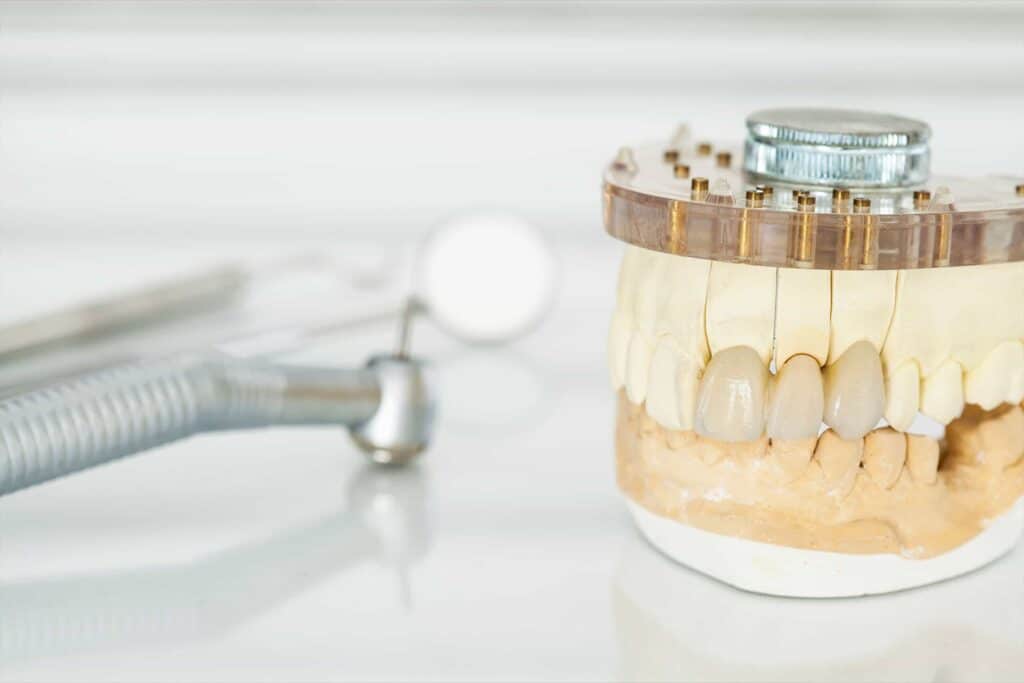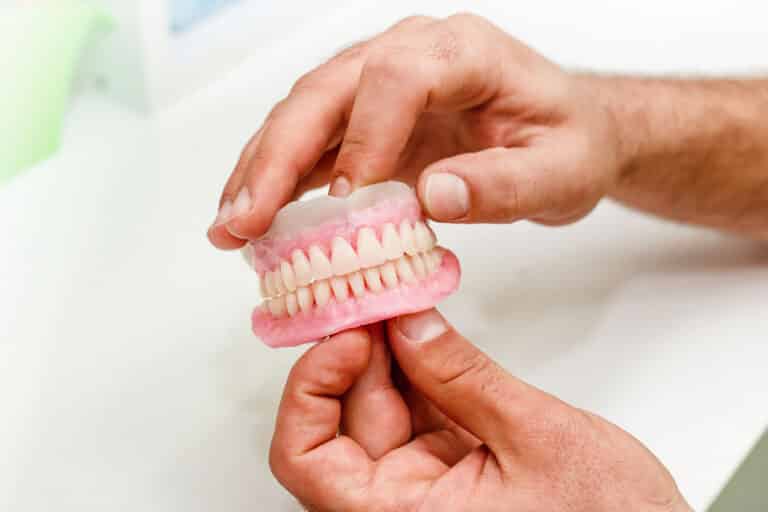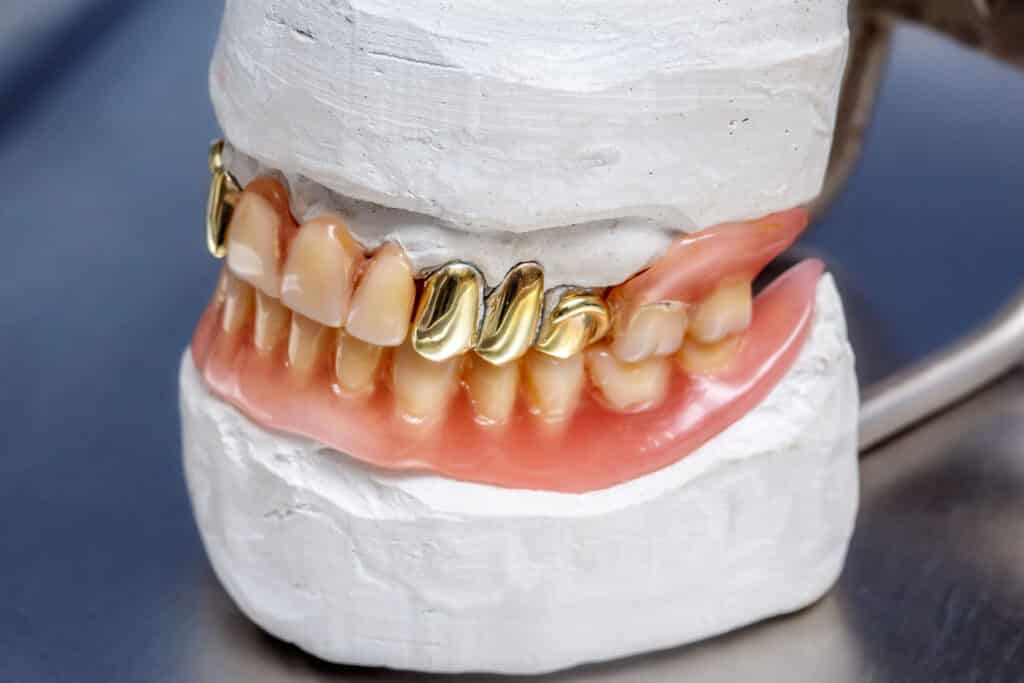It’s undeniable that gum health is crucial to overall oral health. Proper gum care consists of different habits that shape your oral hygiene routine. Daily maintenance of your gum tissue will help reduce the chances of periodontal disease, which is a painless but serious form of gum disease. Of course visiting your dentist for a checkup and regular cleanings to brushing and flossing daily is also important for your oral health as well.
However, none of us are immune to gum disease or problems with the gums such as gingivitis. It’s important to understand proper care of your teeth and gums as well as what to do if you notice something off with your gums to prevent tooth loss.
How Do I Know If My Gums Are Bad?
Healthy gums appear firm and pink, while unhealthy gums can be red or even purple in color. Unhealthy gingiva tend to feel and look swollen and bleeding gums are also common. In some cases, unhealthy gums can result in gingival recession, causing the gum line to look like they’re pulling away from the teeth.
If you’ve noticed that your gums bleed continuously, there are a handful of causes. It could simply be from gingivitis, due to inflammation from plaque accumulation. Inadequate plaque removal during daily dental care can lead to bleeding gums and puts you at higher risk of more serious forms of gum disease.
When plaque is not removed when flossing and brushing your teeth, it can harden into tartar and lead to swollen and inflamed gums that bleed when brushed. If left alone for long periods of time, the tartar is essentially an infection of the gums and will erode away the jaw bone, which is a form of periodontitis.
The treatment becomes more costly and then requires more frequent professional dental cleanings than someone who has never had periodontitis. This is why preventing gum disease is so important. Prevention can help your immune system and reduce your dental care costs. In other words, it’s healthier and cheaper to prevent gum disease!
What is Periodontal Disease?
Periodontal disease or periodontitis is an advanced form of gingivitis that requires professional dental treatment. When dental plaque isn’t removed, it hardens and attaches to the tooth becoming calculus also known as tartar. Bacteria then accumulates around these rough deposits and flourishes due to warm, dark nature of the mouth as well as easy access to food whenever we eat.
The bacteria have access to your blood stream, which is how gum disease can affect your immune system. Gum disease affects not only your mouth but can make other diseases such as diabetes and heart disease worse.
There is a lot of inflammation around the tartar and the gingiva become swollen and bleed easily. The body views the dental tartar as a form of an infection and the bones surrounding the teeth end up eroding away.
Early signs and symptoms include bleeding when cleaning your teeth and gum recession. When this becomes really severe, the tooth or teeth become loose from all the bone loss. Unfortunately advanced periodontitis can result in tooth loss and it even contributes to tooth decay. When severe enough, the teeth cannot be saved and must be removed.
How Do I Improve My Gum Health?
If your gums aren’t where you think they should be health-wise or your dentist has recommended that you work to improve their health, there are a few things you can do other than attending your routine checkups.
Brush Your Teeth Regularly
Brush your teeth at least twice a day to remove plaque. If you are more prone to cavities you may need to brush more frequently. This is foundational in keeping your gums as healthy as possible and also helps with bad breath. Using fluoride toothpaste can also help reduce your risk of cavities.
Floss Daily
Also incredibly important, dental floss cleans the part of the tooth where your toothbrush can’t clean. Flossing removes the plaque between teeth which is a common area for gingivitis and periodontitis. Most people can get away with flossing once nightly, however those more prone to periodontitis may need to floss twice a day.
Use Mouthwash
Using a mouthwash can reduce the bacteria in your mouth, which is what causes gingivitis and periodontal disease. Be sure to look at what the mouthwash is designed for as some are for gum disease while others are more anti-cavity.
Stop Smoking
Smoking is terrible for your overall health, with your oral health included. Smoking puts you at higher risk of gum disease, both gingivitis and periodontal disease. If you have issues with your gums and smoke, quitting is the best place to start.
Stop Smokeless (Chewing) Tobacco
Smokeless tobacco or chew also increases the risk of various diseases. Even with regular dental care, smokeless tobacco can contribute to problems with your teeth and gums as well as increases your risk of oral cancer.
Diet
A diet high in sugar and simple carbs can also affect your gums. The processed sugars feed the plaque producing bacteria, leading to gingivitis and periodontal disease. Poor diet also increases your risk of systemic diseases such as diabetes, which affects your oral health. Instead, focus on consuming gum-healthy foods, such as fresh fruits and veggies, milk and low-sugar yogurt, water, green tea, nuts, fatty fish, and whole grains. A general rule of thumb is to consume less processed foods and more whole foods.
Eating Frequency
The more frequently you eat food can lead to increased plaque buildup as the bacteria have more opportunities to produce acid. Frequently snacking or eating meals puts you at increased risk of gum disease. This is not to say you cannot eat frequently, however you should be aware of the necessity of increased gum care. You may need to brush and floss more frequently to keep the plaque at bay and keep the gum tissue healthy.
Get Regular Professional Cleanings
Visit your dentist or dental office regularly for professional cleanings. It takes a dentist or dental hygienist to properly remove hardened plaque from your teeth. Additionally, when you visit your dentist regularly, they can keep an eye for early symptoms of gum disease.
When treated properly, gum disease can easily be managed. Remember prevention is key as once the bone is lost between teeth, it’s incredibly difficult and unpredictable to fix. Even a dentist specializing in the gums and bone, known as a periodontist, cannot 100% guarantee teeth treated for severe bone loss can be fixed.
How Do I Brush My Teeth and Gums?
Proper teeth brushing and flossing is key in mitigating gum disease. It is generally accepted to brush your teeth but flossing is done less frequently. Both need to happen daily in order to control gum disease and keep your teeth in place.
How Do I Brush My Teeth?
Brushing your teeth should happen twice daily, especially at night before bed. Angle the toothbrush at 45 degrees to the gums and brush in gentle oval motion for 30 seconds per quadrant for a total of 2 minutes. Ideally a fluoride toothpaste would be used to re-mineralize the teeth. While there are some controversies around fluoride toothpaste, it is generally accepted by dental professionals that fluoride is helpful in controlling tooth decay.
The toothbrush bristles should always be soft as to not damage the gums or teeth. Some early signs of brushing too hard include gum recession and damage to the roots. This may require dental treatment, including a gum graft. Brushing too hard or using a toothbrush with medium or hard bristles damages the gums and teeth.
How Do I Floss?
Floss should happen at daily. The floss should go up and down the side of each tooth to remove plaque and food. You’d be surprised how much food debris and plaque may remain after brushing. There are studies that have shown that while the thick dental floss is more effective than thin, they both are significantly better than if no flossing were to happen.
Can I Improve My Gum Health Naturally?
While it’s super important to seek professional dental treatment for severe gum disease, there are a few ways to improve the health of your teeth and gums at home. Remember, every situation is unique, so be sure you ask your dentist if any of these natural boosters could work for you.
- Rinse your mouth with warm salt water
- Use xylitol containing gums or mints
- Practice the act of oil pulling
- Rinse with a hydrogen peroxide solution
- Maintain or increase your oral hygiene, including brushing and flossing
Much up improving the health of your gums comes down to proper home care. Ensuring the gum line is cleaned well in additional to every surface of every single tooth is important. Gingivitis is reversible, up to three weeks, at which gingivitis starts to turn into periodontitis which is not reversible. Once the bone tissue is lost, it is very unpredictable to regrow even with the best treatment currently available.
Is Chewing Gum Good For My Gum Health?
In some instances, chewing gum can benefit your gums. First, you’ll want to choose sugar-free gum, as picking gum laden with sugar will have the opposite affect and worsen any gum disease.
Chewing sugar-free gum can assist in your oral health by helping you produce more saliva, which helps to protect your teeth. It can also remove trapped foods on or between your teeth. In short, chewing gum and producing more saliva can be really good for your mouth, especially your gums.
Is Xylitol Gum Good for You?
Chewing gum containing xylitol is also another good option. Xylitol is a naturally occurring sugar that helps to reduce dental decay by reducing the number of oral bacteria. It can be an effective tool in reducing gingivitis, plaque, and other common mouth ailments when brushing isn’t practical.
Additionally the American Dental Association states that gum can help “increase the flow of saliva, thereby reducing plaque acid, strengthening the teeth and reducing tooth decay”1https://www.ada.org/resources/research/science-and-research-institute/oral-health-topics/chewing-gum.
If you suffer from constant dry mouth, which can lead to gum disease and tooth decay, or your dentist recommends it, chewing gum can be helpful in maintaining healthy gums. Not to mention chewing gum can also help any bad breath!
Can Gum Disease Cause Other Problems?
When left untreated, gum disease can cause additional health problems. It is well established that there is a connection between your oral tissue and the blood circulating in your body. If your gums constantly bleed, that blood has to come from somewhere. Gum disease, even at an early stage, means more bacteria in your mouth.
That same bacteria in your gums can then leak into your blood stream, which can contribute to a number of health issues including respiratory disease, arthritis, heart disease, diabetes and can also affect your immune system.
Can Gum Disease make COVID-19 Worse?
With COVID-19 being a respiratory problem, there are articles being published that have distinguished a correlation between the severity of COVID-19 problems and periodontal disease2https://www.sciencedirect.com/science/article/pii/S03069877203128463https://www.thieme-connect.com/products/ejournals/html/10.1055/s-0041-1729139. In short, there is a thought that someone with periodontal disease is at increased risk of more severe COVID-19 symptoms.
In other words, periodontal disease can make COVID-19 symptoms worse with all things being equal. The idea is that the increased bacteria in the mouth can easily enter the lungs when mouth breathing. The increased number of pathogens then can exacerbate the COVID-19 symptoms.
How does Gum Disease Affect your Heart?
Gum disease can influence heart disease, atherosclerosis for example. The thought is that an increased number of pathogens in the mouth can access the entire body through the blood stream. This increases the amount of inflammation in the body, which can contribute to increasing atherosclerotic cardiovascular disease4https://www.frontiersin.org/articles/10.3389/fcvm.2020.625579/full.
In light of this, a professional must address any problems with your gums as soon as possible. Luckily for most, the treatment is straightforward and most often involves scaling and root planing, also known as a deep cleaning.
However depending on the stage of infection and amount of bleeding, the treatment may be more involved. If you’re experiencing discomfort, loose teeth, any swelling or other signs of infection, you’ll want to see a dentist as quickly as possible.
Gum Disease and Your Health
Healthy teeth and gums are essential to living a healthy lifestyle. So many components of your overall health are affected by your gums, from self-esteem to ensuring you have a healthy heart. You can ensure that your gums are in fantastic condition through diet and routine dental care. If you have any questions or concerns regarding the health of your gums, reach out to your dentist immediately.
Was this post helpful?
Table of Contents
- How Do I Know If My Gums Are Bad?
- What is Periodontal Disease?
- How Do I Improve My Gum Health?
- How Do I Brush My Teeth and Gums?
- Can I Improve My Gum Health Naturally?
- Is Chewing Gum Good For My Gum Health?
- Can Gum Disease Cause Other Problems?
- Can Gum Disease make COVID-19 Worse?
- How does Gum Disease Affect your Heart?
- Gum Disease and Your Health
References
- 1
- 2
- 3
- 4





